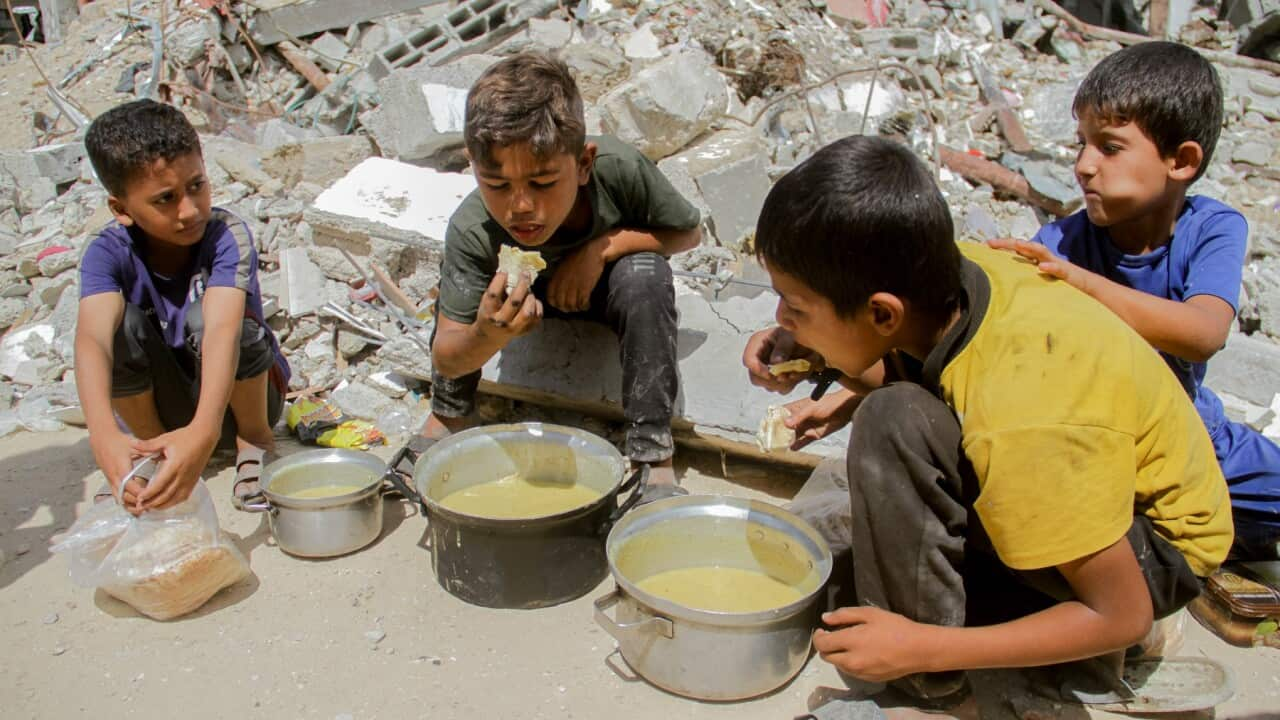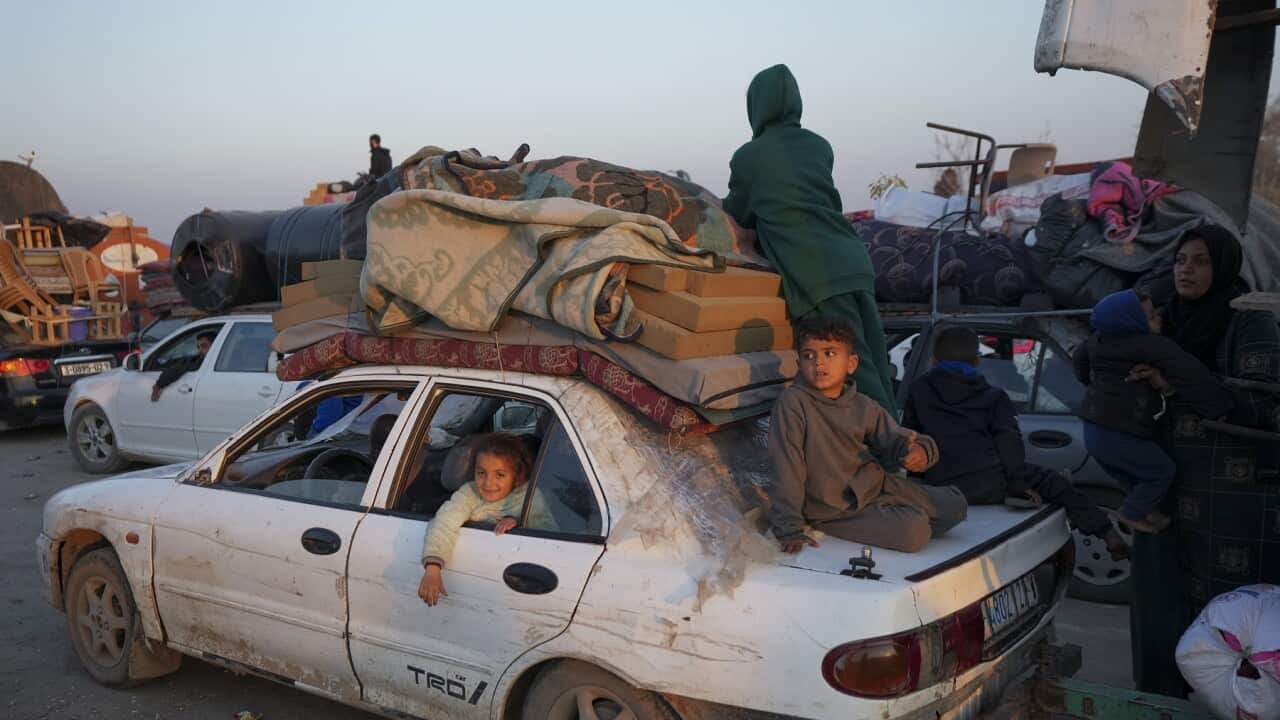TRANSCRIPT
A letter from Washington to Israeli officials – with an ultimatum.
Allow aid into Gaza, or risk an arms embargo.
It's strong stuff from Israel's number one ally and providers of arms.
But the letter – co-authored by U-S Defence Secretary Lloyd Austin and Secretary of State Antony Blinken, and sent to their Israeli counterparts – was intended to be private diplomatic correspondence, according to U-S Defence Department spokeswoman Sabrina Singh.
REPORTER: "Why wasn't it a phone call? Why was it a letter?"
SINGH: "Okay, well, appreciate the question, but we didn't know it was going to get out. We didn't know that someone was going to – All I can tell you is that the secretary and Secretary Blinken sent a letter. Not going to go into those details. I've seen the social media reports out there, but I'm just not going to go into more details of a letter.
The letter – posted in full by an Axios reporter to social media platform X – is the clearest ultimatum yet to Prime Minister Benjamin Netanyahu's government since it began its devastating assault on Gaza after Hamas' attacks on Israel last October.
The U-S letter calls Israel's aid restrictions burdensome and excessive, citing a block on commercial imports and the denial of most humanitarian movements between northern and southern Gaza.
In the past two weeks alone, Israel has blocked nearly all food aid from entering northern Gaza, leaving some 400,000 Palestinians at risk of starvation.
Acknowledging the letter has now become public, State Department Spokesperson Matthew Miller says it should come as no surprise.
“I think you have to put this letter in the context of our ongoing and long-lasting communications and concerns about the levels of humanitarian assistance that have made it to Palestinian civilians. If you go back to April, the Secretary wrote at the time to Mr Gallant to make clear that we had seen the levels of humanitarian assistance plateau, and then after they plateaued, start to decline and made clear that at the time that the levels were unacceptable and that we needed to see Israel implement changes."
The letter outlines specific steps Israel must take within 30 days, including enabling a minimum of 350 trucks to enter Gaza per day, instituting pauses in fighting to allow aid delivery, and rescinding evacuation orders to Palestinian civilians when there is no operational need.
Failure to demonstrate a sustained commitment to implementing and maintaining these measures, it says, may have implications for relevant U-S policy and law.
It's cited Section 620i of the U-S Foreign Assistance Act, which prohibits military aid to countries that impede the delivery of U-S humanitarian assistance.
But U-S National Security spokesperson John Kirby says it’s not to be taken as a threat.
“The only thing I would address is just the sense of urgency that we all have here about the desperate need of the people of Gaza for this humanitarian assistance. So, when we take the step of talking to our Israeli counterparts orally or in writing about this, there's obviously a deep sense of urgency about it.”
The administration also appeared to balance its criticism of Israel's actions in Gaza with a strong show of military support, by announcing the same day as the letter that it would send US troops and advanced anti-missile batteries to Israel.
Meanwhile, Israeli forces are expanding operations into northern Gaza – having now encircled Jabalia for more than ten days, and with tanks sent into the nearby towns of Beit Lahiya and Beit Hanoun.
Israel’s declared aim is stamping out Hamas fighters that it says are trying to regroup there.
But the operation has raised concerns among Palestinians and U-N agencies that Israel wants to clear residents from the north of the crowded enclave.
U-N spokesperson Stephane Dujarric articulating those concerns on behalf of U-N Secretary-General Antonio Guterres.
"The Secretary-General condemns the large number of civilian casualties and the intensifying Israeli campaign in northern Gaza, including its schools displacing sheltered Palestinian civilians. He strongly urges the parties to the conflict, all parties to the conflict, to comply with international humanitarian law and enforced sizes that civilians must be respected and protected at all times. Humanitarian assistance into Gaza is woefully inadequate and is at the lowest level in months."
The latest Israeli military strikes have killed at least 50 Palestinians across the Gaza Strip.
Palestinian health officials say at least 17 of the dead were killed by Israeli fire near Al-Falouja in Jabalia, the largest of Gaza's eight historic refugee camps.
Ahmed Al-Kahlout from the Palestinian Civil Defence says bodies were also being pulled from buildings and off the streets.
IN LANGUAGE GRAB (Arabic) TRANSLATED: "This is the al-Sayyed family house. This is the al-Sayyed family house, and this is the citizen, Ashraf Al-Sayyed and his family. Bodies, torn parts are now in this area, in the area of Al-Furqan mosque. It is a horrible crime, in this area of Al-Falouja (in Jabalia) - a large number of martyrs are being pulled out of homes and from the streets.”
The Gaza Health ministry also says one doctor was killed when he tried to help the people wounded by the strikes in Al-Falouja.
The Israeli military's humanitarian unit, Cogat, which overseas aid and commercial shipments to Gaza, said in a statement that the operations in Jabalia were targeting terrorist infrastructure and operatives embedded inside civilian areas – an assertion Hamas denies.
In Lebanon, rescue workers are facing the aftermath of a strike in the Christian-majority town of Aitou, in the country’s north – collecting human remains from the 22 killed among piles of rubble.
Most of the dead are women.
Shadel Hassan, who witnessed the strike, became internally displaced after his family moved to Aitou to escape Israeli strikes further south.
IN LANGUAGE GRAB (Arabic) TRANSLATED: "Everything is gone, the clothes, savings, personal belongings, my gold, everything. Nothing was found, everything went under the rubble. There is nothing.”
As with Gaza, children in Lebanon are suffering under ongoing hostility.
The U-N estimates that 400,000 children in Lebanon have been displaced in the past three weeks of war, warning of a lost generation.
Jennifer Moorehead, the country director for Save the Children, operates a shelter centre in the Chouf area.
She says the situation for children in Lebanon is dire.
"There are very significant pressures on a system that was already fragile after five years of repeated crisis. So it's a very precarious situation. We are not prepared enough and children and their families are paying the price, not just of the conflict but also of our ability to support and protect."













